|
|
|
Sort Order |
|
|
|
Items / Page
|
|
|
|
|
|
|
| Srl | Item |
| 1 |
ID:
157490
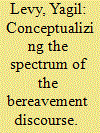

|
|
|
|
|
| Summary/Abstract |
This article presents the spectrum of the bereavement discourse, namely, how various social groups interpret the loss of their children’s lives or the potential risk to their lives posed by their military service and translate it into public discourse, as a spectrum of attitudes. It is argued that this spectrum ranges from subversive to submissive approaches. Furthermore, within the confines of the declining casualty tolerance, two variables cumulatively determine the actors’ choice of discourse: the level of enforcement of recruitment, ranging from conscription to voluntary recruitment, and the social position of the group to which the agents belong. Given that conscription brings powerful, high-status groups into the ranks who may be unwilling to make sacrifices for war, subversive responses are more likely to occur in conscript militaries than in volunteer forces and vice versa. This article maps this spectrum and hypothesizes about its determinants.
|
|
|
|
|
|
|
|
|
|
|
|
|
|
|
|
| 2 |
ID:
098466
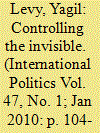

|
|
|
|
|
| Publication |
2010.
|
| Summary/Abstract |
Militaries work intentionally, visibly and in a politically controlled manner to fulfill their formal assignments as the professional perpetrators of external violence on behalf of the state. It is to this level of military action that the existing literature on the civilian control of the military is confined. However, through the intensive interaction between the military and civilians, the effects of formally controlled military activity go beyond the professional domain and are felt in civilian areas, where, in the long term, military activity helps create structures of unequal power relations. Given its structural dimension, this aspect of the military is not necessarily or immediately visible to the main agents involved; hence, it is divorced from effective civilian control. I conceptualize this neglected type of control as effectual control, distinct from the theoretically well-established notion of operational control. This paper theorizes the essence of effectual control.
|
|
|
|
|
|
|
|
|
|
|
|
|
|
|
|
| 3 |
ID:
079577
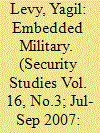

|
|
|
|
|
| Publication |
2007.
|
| Summary/Abstract |
In the summer of 2005, the Israeli military evacuated thousands of Jewish settlers from the Gaza Strip and the northern West Bank in the framework of the Disengagement Plan. Not only was the evacuation swift, but the army also maintained the unity of its ranks and avoided massive refusal of the national religious conscripts who identified with the settlers. It is argued that the effective functioning of the Israel Defense Forces can be attributed to the degree to which it has become embedded primarily within the social networks of the national religious groups that serve within it. The army implemented the evacuation by leveraging the interest of those groups to reinforce the army's status as an apolitical and universal "people's army" by which the groups could preserve their mobility within its ranks. Thus, what prevented the groups from initiating massive clashes with the evacuating troops was their assessment that a confrontation could have undermined the army's status and, by extension, that of the resisting groups - both within the IDF and in civilian society
|
|
|
|
|
|
|
|
|
|
|
|
|
|
|
|
| 4 |
ID:
077871


|
|
|
|
|
| Publication |
2007.
|
| Summary/Abstract |
Since the 1973 War, the secular Ashkenazi middle-class groups, which traditionally had constituted the military's "backbone", have displayed a lack of enthusiasm to continue to bear the military burden, a phenomenon that was publicly portrayed as a "motivation crisis." We conceptualize this process as a shift from a "subjected militarism" that perceived military service as an unconditioned, mandatory national duty to a "contractual militarism," according to which military service is stipulated by the fulfillment of the individual's ambitions and interests, although it remained a formal obligation. Two sites of socializations-school memorial ceremonies and preparation for the military service-serve as mediating mechanisms between the structural, social change and the social agency. Both have been utilized by the dominant groups to re-shape the canon, military ethos in a manner that redefines their relations vis-à-vis the military in contractual terms
|
|
|
|
|
|
|
|
|
|
|
|
|
|
|
|
| 5 |
ID:
155563
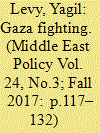

|
|
|
| 6 |
ID:
102940


|
|
|
|
|
| Publication |
2011.
|
| Summary/Abstract |
In an effort to enhance the dialog between the literature on casualty sensitivity and that on civilian control, this article offers an integrative analysis that shows how high levels of casualty sensitivity affect the balance of power between civilians and the military. By drawing on the case of Israel during the Second Lebanon War (2006) and the Gaza War (2009), the article demonstrates that casualty sensitivity has a double effect. Initially, it restrains military action because the military internalizes this casualty shyness and, in response, adopts policies of casualty aversion. Thus, casualty sensitivity empowers civilians (at least, dovish civilians) vis á vis the military. However, the military and political leaders' efforts to compensate for these restraints ultimately give the military even more latitude. These efforts involve military doctrines that allow rapid decision making, contingency plans that weaken civilian control, and the military's control over the cost-informed discourse. Casualty aversion thus affects civilian control.
|
|
|
|
|
|
|
|
|
|
|
|
|
|
|
|
| 7 |
ID:
156641
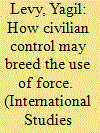

|
|
|
|
|
| Summary/Abstract |
This article is about a puzzle: strong civilian control of the military may promote the use of force not lessen it. Existing theories about civil–military relations and militarism do not adequately resolve this puzzle because they neglect the link between civilian control and the legitimacy to use force. The argument here is that an increase in the civilian control of the military may promote the use of force by legitimizing it under specific cumulative conditions: the existence of a previous militaristic infrastructure in the civilian political culture, which is triggered by an external event, and is augmented by three mechanisms deriving from civilian control that increase the legitimacy of using force by reducing deliberative decision-making. These three mechanisms are: (1) the depoliticization of the military caused by reinforcing civilian control, so the professional opinion of the military reigns supreme; (2) the militarization by inflating threats and setting ambitious war goals to remove such threats, which balances out the aversion to sacrifice for war that civilian control produces; and (3) the transition produced by civilian control to a volunteer, technology-intensive, downsized military that reduces the stake of citizens in military policies. The plausibility of this argument is explored by reference to the cases of the United States, Israel, and Russia.
|
|
|
|
|
|
|
|
|
|
|
|
|
|
|
|
| 8 |
ID:
119637
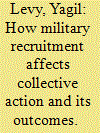

|
|
|
|
|
| Publication |
2013.
|
| Summary/Abstract |
This paper aims to advance the research on the conjunction of two fields-antiwar protest and casualty aversion-by offering a conceptual development of the role of military recruitment in affecting casualty sensitivity-incited antiwar mobilization. Scholars have shown that sensitivity to losses is not a constant variable. Its reflection in the public sphere is affected by variables clustered together as "the politics of war," such as sense of threat, mission success, number of casualties, and elite consensus, which can be mediated by collective actors. However, the role of the mode of military recruitment in influencing collective action in the military realm has been neglected. It is argued that the mode of military recruitment mediates collective actors' ability to leverage the politics of war to challenge dominant discourse and influence war policy, owing to the cumulative impact of four recruitment-related variables: republicanism, social power, the favoring of "voice," and bounded discourse. All shape the movement's framing and resources in a way that affects mobilization.
|
|
|
|
|
|
|
|
|
|
|
|
|
|
|
|
| 9 |
ID:
105669
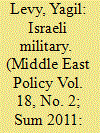

|
|
|
| 10 |
ID:
190330


|
|
|
|
|
| Summary/Abstract |
This article aims at challenging the widely accepted argument that Israel has failed to enforce the law on Jewish communities in the West Bank. It argues instead that, since the 2000s, there has been a gradual creation of two armies within the Israel Defense Forces: alongside the ‘official’ army, a ‘policing’ force has emerged in the Israeli-controlled West Bank. Although it is ostensibly subordinate to formal political authority, it has become a quasi-militia force, relied on by both standing forces and local militias, executing a policy which often oversteps official procedures. Its main unofficial task is to entrench Israel’s grip on the West Bank in the form of informal annexation, without resorting to an internationally unacceptable formal annexation. Thus, this army operates in a grey manner, in a duality of official and unofficial forms of action, while claims about failure in law enforcement are what legitimize the duality of this structure.
|
|
|
|
|
|
|
|
|
|
|
|
|
|
|
|
| 11 |
ID:
129959
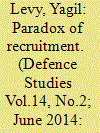

|
|
|
|
|
| Publication |
2014.
|
| Summary/Abstract |
This article compares six cases between the US and Israel in the areas of anti-war mobilization and its impact on military deployment, force protection, and prisoners' swap. It argues that the more the recruitment is built on state-coercion rather than market regulation, the higher the state's sensitivity to the well-being of its soldiers because the likelihood for collective action focused on military issues is higher. The power of republican discourse, the coercion of recruitment on powerful, but sometimes also unwilling enlistees, and the favoring of voice over exit all cause the state to increase its commitment to its soldiers. At the extreme, the state may even favor soldiers' lives more than its commitment to protect the citizens.
|
|
|
|
|
|
|
|
|
|
|
|
|
|
|
|
| 12 |
ID:
183895


|
|
|
|
|
| Summary/Abstract |
The Israel Defense Forces (IDF) were deployed extensively relative to other democracies’ militaries to combat the coronavirus during 2020–1. Ostensibly, the military's engagements are instrumental in addressing the pandemic due to its resources and hierarchical discipline, and especially in light of its centrality in Israel. However, problems remain concerning this deployment, the most prominent and relevant to the case of Israel being the high legitimacy that the Israeli public afforded this policy, especially given the alternative options available to the government. Motivated by this conundrum, I present a circular argument: securitisation legitimised the deployment of the military and in turn, this deployment, constitutive of the discourse of securitisation, further legitimised securitisation. Consequently, Israel could legitimately adopt an enemy-oriented approach to deal with the crisis, an approach that ‘enemises’ the population.
|
|
|
|
|
|
|
|
|
|
|
|
|
|
|
|
| 13 |
ID:
115263
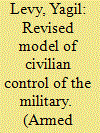

|
|
|
|
|
| Publication |
2012.
|
| Summary/Abstract |
What determines the subordination of the military to civilian control? Existing scholarship has neglected the power structure within which relations between the military and civilians are embedded. Addressing this oversight, this article theorizes that civilian control of the military is influenced by two relations of exchange: (1) the republican exchange, wherein the state provides its citizens with rights in exchange for their military sacrifice; and (2) the control exchange, in which the military subordinates itself to civilian rulers in exchange for resources the state provides. If both relations of exchange are in equilibrium, civilian institutions can establish firm supremacy over the military. This article examines the causes and consequences of disequilibrium. It concludes that disequilibrium in the republican exchange can undermine the control exchange and civilian supremacy over the military. Applications and implications of the theory are developed through examples from the United States and Israel.
|
|
|
|
|
|
|
|
|
|
|
|
|
|
|
|
| 14 |
ID:
100073
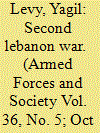

|
|
|
|
|
| Publication |
2010.
|
| Summary/Abstract |
Israel's Second Lebanon War (2006) is a typical manifestation of a flawed war fought by a democratic society. As such, it represents an important opportunity to provide significant evidence regarding the validity of theories that deal with the "democratization of war" syndrome, that is, the limitations imposed on the way democracies wage war and how they cope with these limitations. This article argues that the events of the war exhibit four theoretical propositions, all of which are drawn from the U.S. post-Vietnam experience: speedy decision making to avert public disputes, a weak "civilian" government that struggles to restrain the military, the proclivity to shorten the war and reduce its costs, and the setting of overly ambitious war goals as a means of mobilizing public support. In short, the imperatives derived from the democratization of war syndrome produce mechanisms that work to heighten belligerence rather than temper it.
|
|
|
|
|
|
|
|
|
|
|
|
|
|
|
|
| 15 |
ID:
137622


|
|
|
|
|
| Summary/Abstract |
This article portrays the theocratization of the Israeli military. At the center of this process stands the national-religious sector, which has significantly upgraded its presence in the ranks since the late 1970s. It is argued that four integrated and cumulative processes gradually generated this shift toward the theocratization of the Israeli military: (1) the crafting of institutional arrangements that enable the service of religious soldiers, thereby (2) creating a critical mass of religious soldiers in many combat units, consequently (3) restricting the military command’s intraorganizational autonomy vis-à-vis the religious sector, and paving the road to (4) restricting the Israel Defense Forces autonomy in deploying forces in politically disputable missions.
|
|
|
|
|
|
|
|
|
|
|
|
|
|
|
|
| 16 |
ID:
173754
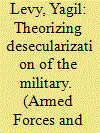

|
|
|
|
|
| Summary/Abstract |
This article addresses scholarly deficiencies in identifying the conditions under which the desecularization of militaries takes place. To theorize this process, two militaries are studied, the United States and Israel. Arguably, six drivers sequentially generate the desecularization of the militaries: (1) Militaries largely mirror the growing influence of religion in the broader society. However, intramilitary drivers play their role in promoting/mitigating the extra-military mechanisms of desecularization. Thus, (2) organizational interests along with external constraints drive militaries to promote religious diversity, which may (3) lead to the empowerment of religious actors, and thereby to further desecularization through religious intolerance, and to (4) reliance on the spiritual and religious services provided by military chaplains, and jointly stimulate (5) the use of religion to motivate military sacrifice. By religiously increasing the symbolic value of military sacrifice, (6) religiosity becomes more naturally associated with good soldiering, thereby reshaping intramilitary hierarchies and, hence, further triggering desecularization.
|
|
|
|
|
|
|
|
|
|
|
|
|
|
|
|
| 17 |
ID:
143281


|
|
|
|
|
| Summary/Abstract |
This article addresses a gap in the scholarly literature. Students of militarism do not link the propensity to use force to the broader issue of what type of civilian control may restrain the use of force. Similarly, even students of civilian control who acknowledge that civilian control and military restraint do not necessarily go hand in hand have not questioned the extent to which we should decouple the two different processes as different modes of control rather than different effects of control. A revised conceptualization of civilian control is therefore offered that distinguishes between two modes of civilian control over military affairs: control of the military, which concerns itself primarily with the military organization, and control of militarization, which draws on the political discourse in which the citizenry plays an active and autonomous role aimed at subjecting the decision to use force to a deliberative process that addresses its legitimacy.
|
|
|
|
|
|
|
|
|
|
|
|
|
|
|
|
| 18 |
ID:
188786
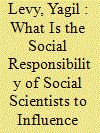

|
|
|
|
|
| Summary/Abstract |
Mainstream scholars of IR favor policy-relevant research, that is the agenda to influence government policymakers by offering policy recommendations. In this article, I offer a different perspective by presenting alternative arguments about social scientists’ responsibility to influence. By drawing on themes of public sociology and critical sociology, security studies and public policy, I argue that the core of this responsibility is to seek to influence policy via engagement with the public rather than with policymakers.
|
|
|
|
|
|
|
|
|
|
|
|
|
|
|
|
|
|
|
|
|